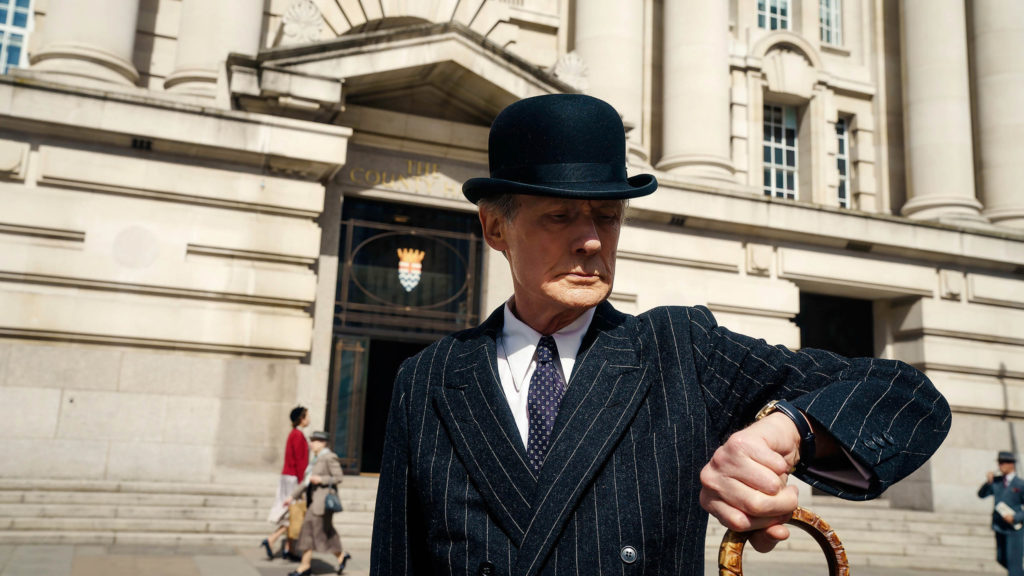Reviews include Civil War, In Flames, and The Greatest Hits.
TFCA Friday: Week of Jan. 28
January 28, 2022
Welcome to TFCA Friday, a weekly round-up of film reviews and articles by TFCA members.
2022 Cineplex Emerging Critic Award!
Have you mastered the perfect Letterboxd review, blogged your heart out about a film you loved, and wondered how to take the next step? We are now accepting applications for the 2022 Cineplex Emerging Critic Award! Writers in the early stages of their careers are encouraged to apply. Get the details here.
This Week in Movies!
The 355 (dir. Simon Kinberg)
“The 355 is enjoyable, go-lady nonsense that eventually exhausts itself with its ambitions to be more,” writes Johanna Schneller at The Globe and Mail. “It’s like watching a woman have a furious argument with herself about a man who doesn’t love her enough, only it’s about spy movies.”
“As expected, it is a cheesy piece of work so expect major cheesiness and no-brain entertainment, and a good time can be had,” admits Gilbert Seah at Afro Toronto.
“Due to pandemic theatre-closing, I’ve had more than a month to consider, even to reconsider, my take on The 355, a parboiled action spy thriller involving an international team of female super agents thwarting a worldwide catastrophe,” admits Thom Ernst at Original Cin. “At its best, The 355 is a well-cast film boasting of prominent female roles led by Jessica Chastain.”
Being a Human Person (dir. Fred Scott)
“Watching Being a Human Person is as much enjoyable as sitting through a new [Roy] Andersson film,” notes Gilbert Seah at Afro Toronto.
Boris Karloff: The Man Behind the Monsters (dir. Thomas Hamilton)
“[E]nlightening, insightful and entertaining doc does justice to Boris Karloff, the legend and to the legacy of classic horror films,” says Gilbert Seah at Afro Toronto.
Clerk (dir. Malcolm Ingram; Feb. 1)
“If one is not that interested in Kevin Smith as a filmmaker, this doc will come across as a bit much, touting him as super talented, super funny and super lucky,” writes Gilbert Seah at Afro Toronto. “But to his die-hard fans, Smith might very well be.”
Ice Age: The Adventures of Buck Wild (dir. John C. Donkin)
“The humour is mostly infantile, jokes flat and plot unimaginative,” groans Gilbert Seah at Afro Toronto.
I’m Not in Love (dir. Col Spector)
“Quite funny and worth a look!” encourages Gilbert Seah at Afro Toronto.
One Shot (dir. James Nunn)
“[T]he kind of cheesy action thriller that, like most cheesy films, is so watchable because of the fact – an easy film to watch, when getting a good giggle from its flaws,” admits Gilbert Seah at Afro Toronto.
Rifkin’s Festival (dir. Woody Allen)
“Pure Allen – old-timey jazz, that familiar titles and credits font, the same navel-gazing ageing males pondering their romantic lives, the young women they are drawn to him. For film buffs it’s a reference funfair,” notes Anne Brodie at What She Said.
Salt in My Soul (dir. Will Battersby)
At Afro Toronto, Gilbert Seah calls it “a good cry and feel good film at the same time.”

A Festival of Festival Coverage:
Sundance Succeeds, ReFrame Returns, Slamdance Starts
At the Toronto Star, Peter Howell picks his ten favourite films at this year’s Sundance Film Festival. Highlights include Navalny, a late addition from Toronto’s Daniel Roher (“pulses with the energy of a great spy novel”), the Bill Nighy drama Living (“The beautiful outcome in both form and spirit makes “Living” an instant classic), and the volcano doc Fire of Love (“commits to a mad embrace of destiny, with eye-searing archival footage and an appreciation of the ineffability of devotion”).
At POV Magazine, Pat Mullen chats with Alan Cumming and Jono McLeod about their fun Sundance doc My Old School in which Cumming lip-syncs an interview from McLeod’s former schoolmate who caused a Scottish scandal. “I have a joke about at my bar, at Club Cumming in New York, that if we’re gonna have drag queens lip-syncing, they had better know the words,” says Cumming. “There’s no excuse for a lip-syncing drag queen who doesn’t know the words. I feel I can now throw the gauntlet down.” Other Sundance highlights include The Territory (“fearless filmmaking”), Living (“Nighy’s performance is a masterclass in restraint”), and Am I OK? (“a never-better Dakota Johnson”).
At POV Magazine, Jason Gorber speaks with Tantura director Alon Schwarz about his provocative film that excavates the past and confronts Israel’s history of national myth-making: “Can we, as a people, as a nation that I love, grow up, mature, recognize another side, and believe again in peace?” says Schwarz. “We stopped believing in peace, as a people, as a country, and as a region. It’s part of a bigger lack of believing in the world, but that’s a different story. I want to get back to simple values of truth in a post-truth world. I’m a dreamer.”
At That Shelf, Courtney Small looks at Jesse Eisenberg’s directorial debut When You Finish Saving the World and generally likes what he sees: “Evelyn and Ziggy’s narcissism may alter how they approach the world, but it is the strong performances by [Julianne] Moore and [Finn] Wolfhard that make Eisenberg’s debut so engaging. Moore and Wolfhard skillfully ensure that one is constantly invested in these two unlikable characters.”
Also at That Shelf, Victor Stiff explores the NFB’s virtual reality project This Is Not a Ceremony: “What separates This Is Not a Ceremony from similar documentaries is how Ahnahktsipiitaa literally pulls the viewer inside the story. The experience occurs from a first-person perspective, with the story’s narrators speaking directly to you. Unlike a traditional doc, you’re not watching talking heads chatting on a screen; you’re at the centre of a conversation – albeit one-way.”
At Classical FM, Marc Glassman previews Peterborough’s ReFrame Film Festival: “Over 70 features, shorts, talks and Q&As can be seen at the ReFrame Film Festival over the next week. It’s a great opportunity to be engaged with the world politically and emotionally without leaving your snow covered home. An almost overwhelming number of docs are on hand to view, many of which are deserving of viewing time and thoughtful consideration.” Highlights include Paper & Glue and The Viewing Booth.
At Original Cin, Liam Lacey checks out the found footage flick Therapy Dogs from Mississauga’s Ethan Eng, which screens at Slamdance: “Even at 83 minutes, Therapy Dogs can feel repetitive and disconnected (as, in fairness, can being in high school) and the dramatic inventions aren’t always credibly integrated with the found footage. Notably, the focus on lonely guys and their horny violent fun pretty much leaves out girls, including girls as friends,” writes Lacey. “Those qualifications aside, Therapy Dogs is a real accomplishment, a dispatch from the adolescent war front that doesn’t stint on the gory details.”
TV Talk: We All Talk About Cosby
At NOW Toronto, Norm Wilner finds the star-studded The Afterparty a welcome oasis amid binge-watching junk: “I’ve been watching a lot of television lately – yes, I know, we all have – and The Afterparty feels like the most fun I’ve had in like a thousand years. It’s fast, it’s clever, it’s endlessly inventive and it’s just so damn pleasurable. Everything sucks right now; The Afterparty does not.” As for everything that sucks right try, see The Woman in the House Across the Street from the Girl in the Window, is “an almost remarkable failure of concept and execution…how hard can it be to make fun of paranoid-white-lady thrillers?” asks Wilner. In from the Cold, meanwhile, finds a happy medium between quality and junk. “[I]t’s a popcorn show that revels in yes-anding itself into ever more ridiculous corners,” writes Wilner.
Also at NOW Toronto, Radheyan Simonpillai digs into the doc-series We Need to Talk About Cosby and the man social factors it addresses: “Throughout the series, Bell, as candid as can be, weighs his responsibility as a Black man in comedy to address the difficult truth about his childhood hero, especially when few others feel safe to do so… His approach is really simple and effective.”
At That Shelf, Courtney Small agrees. “We Need to Talk About Cosby captures just how much celebrity worship blinds us to the horrors often staring us right in the face. Bell effectively shows how the warning signs were there, even Cosby himself seemed to allude to them in some of his routines, but society chose to drive through anyways. Putting the onus on the victims, and not the accused, to jump through hoops to prove guilt.”
At What She Said, Anne Brodie finds We Need to Talk About Cosby to be difficult, but necessary: “[It] speaks home truths many admit they find uncomfortable. This painstakingly detailed four-parter presents the story of the nice guy character Cosby created to be his avatar.” Pam & Tommy, however, is “Cheesy, tacky, porn-obsessed and loaded.” But Anne disagrees with Norm about The Woman in the House Across the Street from the Girl in the Window, writing, “This is fun, fun, ridiculous fun.” Similarly, Hope Street is a “[f]un distraction from hustle and bustle.”
At the Toronto Star, Peter Howell agrees that we need to talk about Cosby: “Bell’s doc goes deep, sparking difficult conversations, especially within the Black community that idolized Cosby, about society’s failure to acknowledge and stop rape culture and ‘how we confuse a celebrity’s image with their reality.’ It’s devastating and essential viewing, carefully sourced and compassionately presented.”
At POV Magazine, Jason Gorber calls the series “a rich and rewarding full conversation” and speaks with We Need to Talk About Cosby director W. Kamau Bell and learns how his background as a stand-up comic helped him navigate the material. “As a stand-up comic, you’re used to navigating crowd dynamics, so, as I’m making the film, I’m thinking about who’s watching it and who I want to talk to in individual moments,” says Bell. “I’m also used to focusing on one section of the crowd because I see there’s something they need me to address. With the doc, sometimes I’m 100% talking to Black people and going, ‘Look, I know what some of you are thinking. I’m with you on this.’”
At Original Cin, Liam Lacey checks out the TV doc Come Clean by Derreck Roemer and Neil Graham. “Shot mostly in 2019 before the pandemic, and with no mention of the opioid crisis, the film…is really a narrowly focused human-interest story about four people trying to change their lives in one small-town addiction treatment facility,” writes Lacey. “It’s a film full of good intentions though perhaps more interesting for the questions it raises than the answers it gives.”



